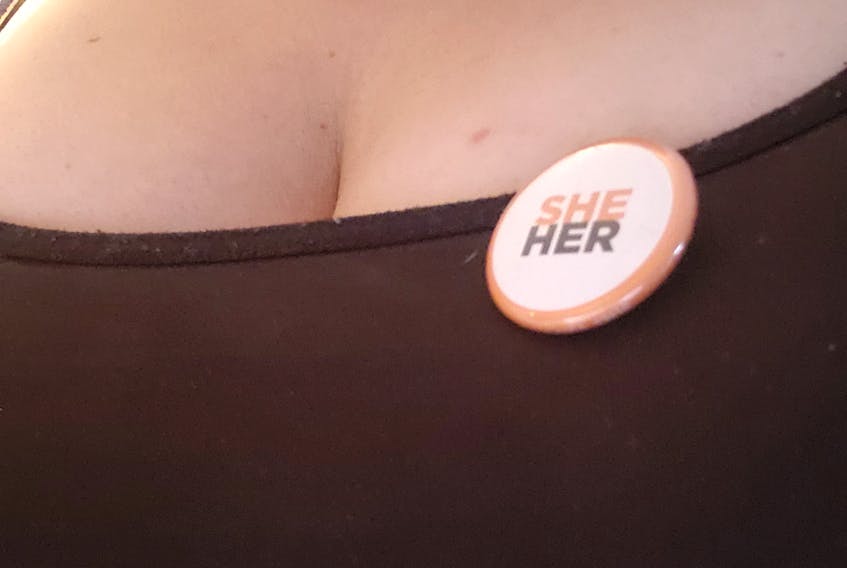SYDNEY, N.S. — Jolyne wore her pronoun pins to her blood collection appointment not to say she's proud to be living her authentic self.
She wore them to avoid misgendering at the Cape Breton Regional Hospital because it has happened in the past; every time Jolyne's gone since transitioning 20 months ago.
"I once had a triage nurse ask me, 'Are you taking any medications?' and I tell her, 'Okay, I'm taking estradiol and Spironolactone.' And she looked at me and said, 'Why would a man want to take estrogen,'" the trans woman explained.
Jolyne spoke to the Cape Breton Post on the condition only her first name be used because she doesn't want to be seen as the person causing problems. It's the same reason she hasn't filed a formal complaint.
"I still have to go there," she explained. "I don't want to be, 'Oh look, there's the person who started the complaint.'"
Cape Breton Transgender Network founder and gender-affirming care activist Veronica Merryfield has filed many complaints on behalf of trans patients misgendered at Cape Breton Regional Hospital because complaints can't be made anonymously. The people Merryfield advocates for fear filing complaints themselves will result in more transphobic attitudes or discrimination during future hospital visits.
"At the worst end of this scale, if somebody is already having a fair number of mental health issues around this, which is prevalent because of what they've been through, the misgendering or dead naming (called by their former name) can be the last nail in their coffin, literally," said Merryfield, who has been advocating to gender-affirming care for 30 years.
"At best, it just feels disrespectful, it feels like people aren't paying attention and quite frankly, I don't understand it."
The appointment
Like many transgender people transitioning, Jolyne's identification and health card are still in her former name with her incorrect gender — the one assigned at birth.
Along with her "she/her" pin on her chest, her name written in big letters on her requisition sheet as well as preferred pronouns listed, Jolyne's blood work included checking estrogen levels — all indicators she is trans.
However, she was still dead named by everyone she encountered on the Oct. 25 appointment; from the person who checked her sheet, to the administration who checked her into the blood collections staff.
The appointment made Jolyne angry.
"It really ruins my day. Like, it really does because it's like, I can leave the house in the morning and look at myself in the mirror and think now I can see the differences, I can see how far I've come. And by somebody doing that to me it feels like I've made no progress at all," explained Jolyne, who was suffering from extreme suicidal thoughts before coming out due to pretending to be the gender she wasn't.
"I was just upset in general. Like, it just completely crushed my confidence for the day. It wasn't a good day."
Nova Scotia Health response
An interview request with a Nova Scotia Health (NSH) representative was not granted but a written statement was provided.
"This patient's experience is unfortunate, and we apologize for any harm that it has caused. Nova Scotia Health recognizes the importance and need to educate more of our employees about 2SLGBTQIA+ diversity, pronouns, sexual orientation and gender identity. This training is available on a voluntary basis for all staff and is mandatory for primary health care staff," the statement reads.
Related
- 'Now I am myself': A Cape Breton woman's 40-year journey to live as she
- Nova Scotia health coverage's ‘restrictive rules’ keeping trans woman from getting needed surgery
- Dominion teen first transgender person named high school valedictorian in Cape Breton
The reason given for being unable to grant an interview was there is no one currently available until they finish creating a "diversity, equity and inclusion network."
"While the work has been delayed due to the pandemic, we are creating a diversity, equity and inclusion network, which is a multidisciplinary team that will design, evaluate and collaborate on strategies to ensure culturally sensitive and safe person- and family-centred care and impact and influence leadership, decision making and policy," NSH said.
"The network will be foundational to Nova Scotia Health's efforts to provide a safe and supportive workplace and to truly deliver person-centred care to the people of Nova Scotia."
The statement also asks for people who have experienced situations where they have been misgendered or experienced other situations where they felt "they have been harmed, has experienced discrimination or has suggestions on how to provide more affirming care to please reach out to patient relations at [email protected]."
Misgendering harm
Merryfield said she hears from people being misgendered at Cape Breton Regional Hospital at least once a month.
Along with misgendering, she hears of a lot of cases of trans people dealing with "broken arm syndrome." This is when a patient goes in with an ailment unrelated to their transitioning yet the medical professional brushes the symptoms off as having to do with them being transgender.
Cape Breton Youth Project education coordinator Madonna Doucette said she has heard from numerous non-binary and transgender youth who were misgendered when seeking help at Cape Breton Regional Hospital.
"I had one youth in (a mental health) crisis a few years back and the admitting nurse refused to use their name and pronouns. Tut-tutted them and said, "We will stick to what's on your health card,'" said Doucette, who noted this happens so frequently that talking about it wouldn't identify the youth she's speaking of.
To file a complaint or concern
- NSA Patient Relations
- Cape Breton, Antigonish and Guysborough Areas
- Toll Free: 1-844-884-4177
- Email: [email protected]
Jolyne hopes by coming forward with her story it will force Cape Breton Regional Hospital to "do better."
One doctor Jolyne had during an emergency department examination did get it right.
"Once I explained to him this is the case, he was 100 per cent fine with it. And he even gave the nurses shit if they didn't," Jolyne remembers.
"In my eyes, I was like, Yes! You know what I mean? Why aren't they all like this?"
Jolyne believes training in dealing with 2SLGBTQIA+ patients is needed for all hospital staff and this is something Merryfield has been advocating for.
"I know from other LGBT nurses in Nova Scotia Health that there is a training need (in gender-affirming care and the use of non-gender specific language)," she said.
"And it's not rocket science. It's not difficult. It's really quite simple to do. But, you know, if nobody's being shown it, it would be lacking."
Nicole Sullivan is an immigration/diversity and education reporter for the Cape Breton Post.









